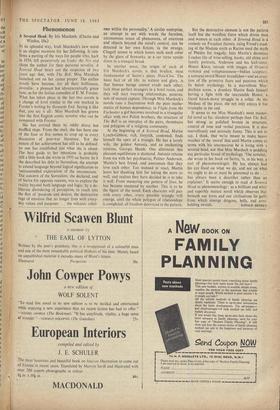Phenomenon
A Severed Head. By Iris Murdoch. (Chatto and Windus, 18s.)
IN its splendid way, Irish Murdoch's new novel is an elegiac occasion for her following. It con- firms a parting of the ways for people who, back in 1954, fell possessively on Under the Net and chose the author for their personal novelist. A Severed Head bears out the suspicion of two years ago that, with The Bell, Miss Murdoch launched out on her career proper. The earlier novels have become, for all their brilliances, juvenilia: a pleasant but idiosyncratically green taste, as for the Italian comedies of E. M. Forster. What has taken place in the last two novels is a change of level similar to the one marked in Forster's writing by Howards End. Saying it like that, you say it all: Miss Murdoch has grown into the first English comic novelist who can be compared with Forster.
She has arrived there by oddly direct but muffled steps. From the start, she has been one of the four or five names to crop up in every discussion of post-war literature. Yet the nature of her achievement has still to be defined; no one has established just what she is about. The best guide to her intentions is probably still a little book she wrote in 1953 on Sartre. In it she described his debt to Surrealism, the attempt to extend language beyond logical signification to 'untrammelled exploration of the unconscious.' The concern of the Surrealists, she declared, and of Sartre for opposite reasons, was to explore the reality beyond both language and logic; by a de- liberate disordering of perception, to reach into the flux of 'passions and desires, the destructive rage of emotion that no longer lives with every- day values and purposes . . . the volcanic other- ness within the personality.' A similar enterprise, an attempt to net with words the formless, autonomous ocean of phenomena, of emotions and objects beyond the mind's control, can be detected in her own fiction; in the strange, Chagall scenes in which lovers stalk each other by the glare of fireworks, or a car turns upside down in a tranquil brook.
In another sense, the origin of each of Iris Murdoch's novels is that briefest, most fundamental of Sartre's plays, Huis-Chas. The basic fact of all life, its torture and glory, is that human beings cannot evade each other; lock three perfect strangers in a hotel room, and they will start weaving relationships, patterns, nets of mutual capture. Through Miss Murdoch's novels runs a fascination with the pure mathe- matics of human dependence; in Flight from the Enchanter a girl becomes involved in a triangular affair with two Polish brothers, the structure of The Bell is an interplay of the pairs, rhombuses and polygons of a religious community.
At the beginning of A Severed Head, Martin Lynch-Gibbon, rich, fortyish, contented, finds himself the apex of .a triangle. He has a lovely wife, the golden Antonia, and an enchanting mistress, Georgie Hands. One afternoon this pleasant equilibrium is shattered. Antonia returns from tea with her psychiatrist, Palmer Anderson, Martin's best friend, and announces that they love each other. Too stunned to react, Martin hears her thanking him for taking the news so well, and realises they have decided he is to take it well. From mastering one pattern of lives, he has become mastered by another. This is to be the figure of the novel. Each character will pair with every other, every possible triangle will emerge, until the whole polygon of relationships is completed. all freedom destroyed in the pattern. But the destructive element is not the pattern itself but the wordless force which drives men and women at each other. A Severed Head is a comedy on Freudian themes, using Freud's read- ing of the Medusa myth as Racine used the myth of Phedre for tragedy. Into Martin's decorous London life of wine-selling, books, old china and family portraits, Anderson and his half-sister, Honor Klein, intrude with images of Oriental violence and voluptuousness—Indian sculpture, a samurai sword Honor brandishes—and an erup- tion of the primitive fears and passions which lie below mythology. In a marvellous Mur- dochian scene, a drunken Martin finds himself having a fight with the inscrutable Honor, a literal knock-down struggle in a cellar. As the Medusa of the piece, she not only enjoys it but triumphs in the end.
It seems to me Miss Murdoch's most master- ful novel so far; slenderer perhaps than The Bell, but strong as polished bronze in structure, control of tone and verbal precision. It, is also marvellously and seriously funny. This is not to say, I think, that we're meant to make, heavy weather of the 'moral' that until Martin comes to terms with his unconscious he is living with a severed head, nor that Miss Murdoch is peddling any particular brand of mythology. `The novelist.' she wrote in her book on Sartre, `is, in his way, a sort of phenomenologist. He has always had his eye fixed on what we do, and not on what we ought to do or must be presumed to do . . . has always been a describer rather than an explainer.' It stems enough to read A Severed Head as phenomenology: as a brilliant and witty and superbly mature novel which observes that beneath our loves and our civilisations lie gulfs from which emerge dragons, bells, and arms










































 Previous page
Previous page